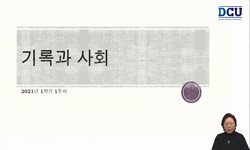On the surface, the spread of the genealogy compilation culture in Manchuria society can be seen as an example indicating that they have become Hanhua(漢化). However, even if the genealogy originated from the Han culture, the Manchurian genealogy of...
http://chineseinput.net/에서 pinyin(병음)방식으로 중국어를 변환할 수 있습니다.
변환된 중국어를 복사하여 사용하시면 됩니다.
- 中文 을 입력하시려면 zhongwen을 입력하시고 space를누르시면됩니다.
- 北京 을 입력하시려면 beijing을 입력하시고 space를 누르시면 됩니다.

청대 만주 사회의 족보 편찬 문화 확산과 족보 활용 = The spread and use of genealogy compilation culture in Manchuria society in the Qing Dynasty
한글로보기https://www.riss.kr/link?id=A108335899
- 저자
- 발행기관
- 학술지명
- 권호사항
-
발행연도
2022
-
작성언어
-
- 주제어
-
KDC
900
-
등재정보
KCI등재
-
자료형태
학술저널
-
수록면
65-98(34쪽)
- 제공처
-
0
상세조회 -
0
다운로드
부가정보
다국어 초록 (Multilingual Abstract)
Unlike the Chinese of the same time, the national-led official genealogy was compiled in the Manchurian society. The official genealogy was formed and spread with mutual influence rather than unilateral propagation to Manchuria society. The reason why the Qing Dynasty ruler spread the genealogy, a foreign culture, to Manchurian society was that genealogy had a practical function necessary to maintain Manchurian society. Meanwhile, the appearance of the Manchurian genealogy is also different from the Chinese genealogy, such as mixed Manchu and Chinese language genealogies. This type of genealogy can represent the coexistence and cultural convergence of Manchu and Han.
On the surface, the spread of the genealogy compilation culture in Manchuria society can be seen as an example indicating that they have become Hanhua(漢化). However, even if the genealogy originated from the Han culture, the Manchurian genealogy of the Qing Dynasty also has its own specificity, like the genealogy of various ethnic groups in East Asia. Of course, based on the various characteristics of the Manchurian genealogy mentioned in the text, it is not intended to argue that the Manchurian was not become Hanhua. Because this is an individual problem, not a problem that can be concluded through any part. Therefore, instead of discriminating whether it is Hanhua through genealogy, we tried to find answers to more essential questions about how genealogy affected Manchuria society. Specifically, why genealogy was needed in Manchuria society? And how it spread to Manchuria society, what genealogy spread means in Manchuria society, etc.
Unlike the Chinese of the same time, the national-led official genealogy was compiled in the Manchurian society. The official genealogy was formed and spread with mutual influence rather than unilateral propagation to Manchuria society. The reason why the Qing Dynasty ruler spread the genealogy, a foreign culture, to Manchurian society was that genealogy had a practical function necessary to maintain Manchurian society. Meanwhile, the appearance of the Manchurian genealogy is also different from the Chinese genealogy, such as mixed Manchu and Chinese language genealogies. This type of genealogy can represent the coexistence and cultural convergence of Manchu and Han.
동일학술지(권/호) 다른 논문
-
- 명청사학회
- 金成修 ( Sung Soo Kim )
- 2022
- KCI등재
-
海澄에서 厦門으로 ― 16~17세기 복건 해외무역 창구의 변화 ―
- 명청사학회
- 蔡暻洙 ( Chae Kyung-soo )
- 2022
- KCI등재
-
- 명청사학회
- 曺永憲 ( Cho Young-hun )
- 2022
- KCI등재
-
- 명청사학회
- 金暻綠 ( Kim Kyeong Lok )
- 2022
- KCI등재




 KCI
KCI KISS
KISS




